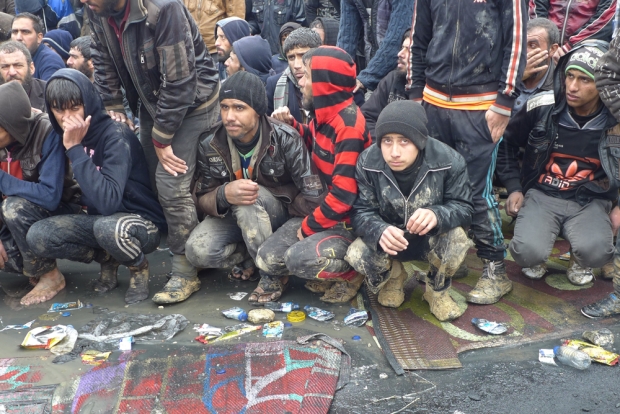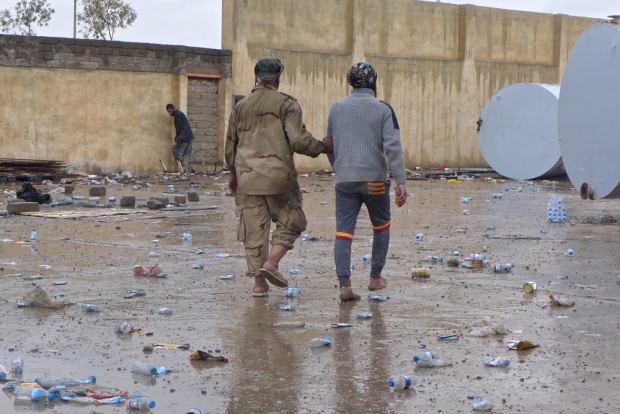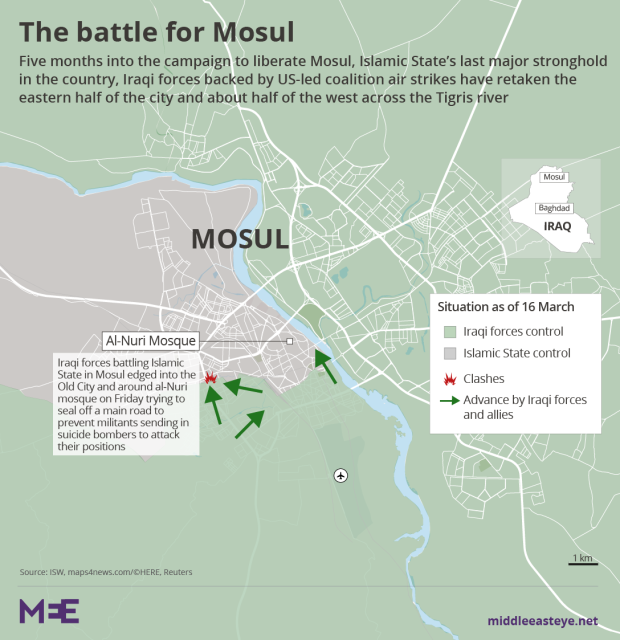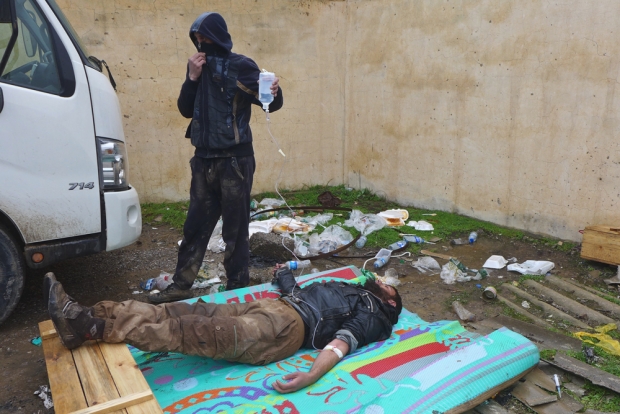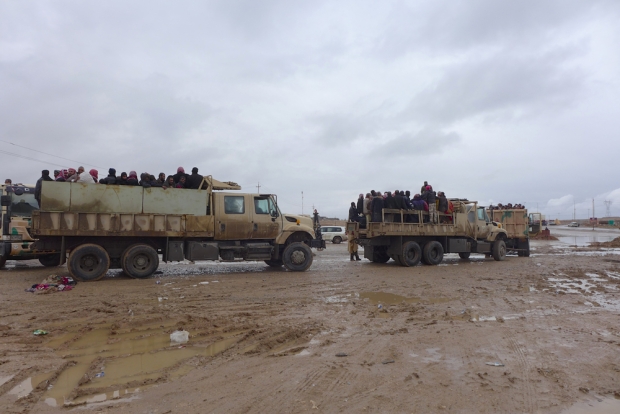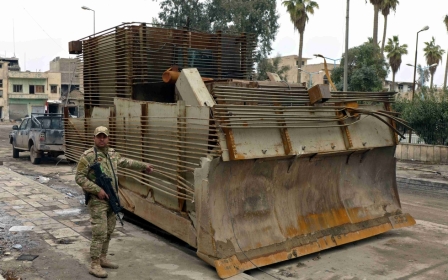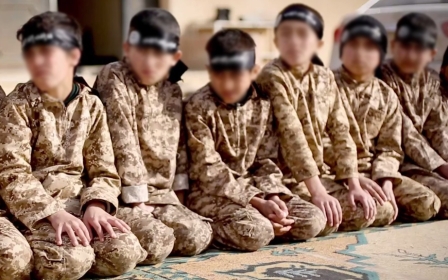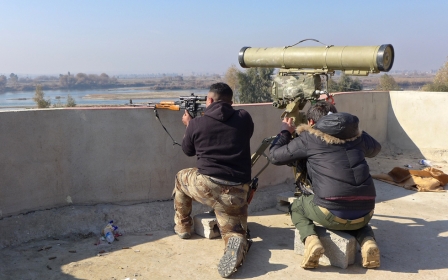Battle for Mosul: 'We'll probably kill him later. The prisons are full'
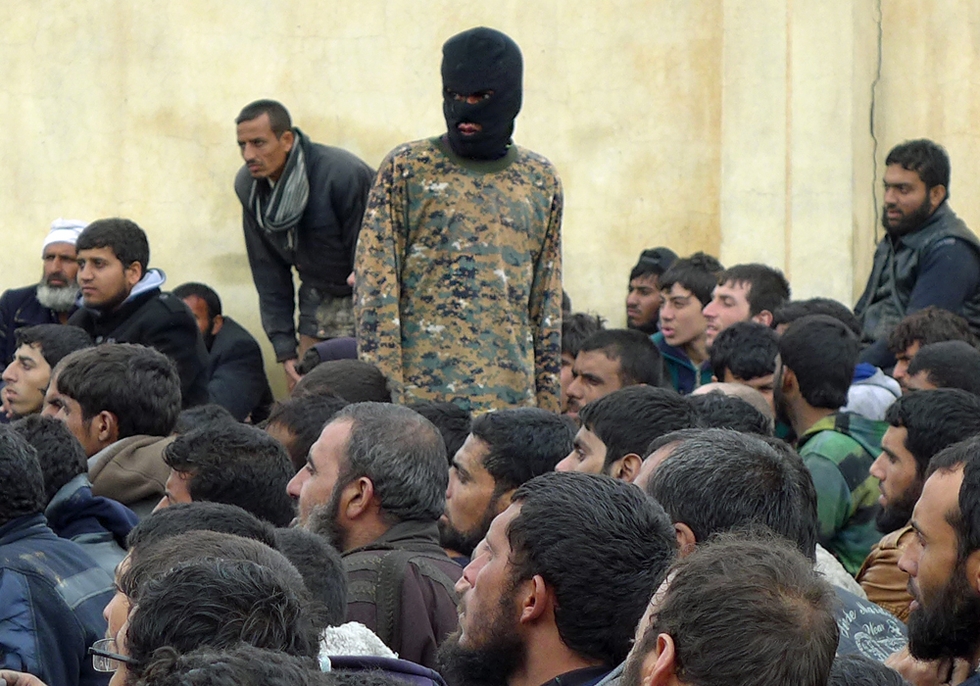
MOSUL, Iraq - Hundreds of men crouch on the wet concrete of a former car mechanic's yard turned into a makeshift screening centre for fleeing Mosul residents. Some are barefoot or in mud-sodden socks and many shiver with cold. Most have walked for hours overnight through the front lines of fighting between Iraqi forces and the Islamic State to reach safety.
Through the window of a truck, an Iraqi special forces soldier checks identity cards against a computer database listing hundreds of known IS members, while a lieutenant paces up and down in front of the crouching men, urging them to point out any hidden IS affiliates.
"Daesh came here from other countries to kill you. Even now, Chechen IS are dropping mortar bombs on your homes," he shouts against the wind.
"We have come from the south of Iraq to rescue you, so be real with us and tell us who among you here was with Daesh."
Daesh came here from other countries to kill you... be real with us and tell us who among you here was with Daesh
- Iraqi soldier at Akrab
This is Akrab screening centre, about five miles outside Mosul, where Iraqi special forces and counter-terrorism units flush out militants now fleeing the city disguised as civilians.
Mohammed, who looks no older than 14, admits he worked in an IS bomb factory and later at an IS checkpoint. "I didn't fight or kill anyone," he says hastily. "I just worked with them for the money."
After being given cigarettes, he stands near the soldiers, smoking and looking self-important.
A man in military uniform, his features hidden by a scarf wrapped tightly around his face, walks slowly among the men. He is apparently an intelligence officer from Mosul. Many soldiers cover their faces - dealing with IS suspects whose friends or relatives may still be fighting for IS in Mosul is dangerous work.
A soldier tells MEE that up to 30 of the approximately 3,000 people fleeing Mosul daily are identified as IS at the screening centre. There were 24 arrests the previous day.
The rain falls heavier, extinguishing the toxic smoke from a burning tyre that had provided little warmth. A rattle of gunfire echoes through the air. The Akrab screening centre is miles from the frontline.
"Where is Omar Mahmoud?" shouts the special forces lieutenant, striding back from the containers. A new suspect has been identified by one of the prisoners.
"Sit down and don't speak. Listen to me properly. Who is Omar Mahmoud?" The men stare miserably ahead, wearing the look of utterly defeated men. And the lieutenant is losing patience.
If I call your name and you don't come here, I'm going to break your head with this stick
- Iraqi special forces soldier
"If I call your name and you don't come here, I'm going to break your head with this stick," he says, brandishing his baton in the air. "If I find your name on our computer, I'm going to stick this up your backside."
A man in his late 20s wearing a brown tracksuit makes his way through the huddled mass, smiling cheerfully as if he has won a prize. The lieutenant stares hard and then says mildly: "I've been calling you for ages. Why didn't you come before?"
The man, who admits to having been a low-level emir with IS, is taken to one side. The lieutenant lights them both cigarettes and offers what passes at Akrab for smalltalk.
"Tell me, how many women did you have sex with, when you were with IS?" The emir smiles and replies: "None, that's forbidden."
The lieutenant inhales deeply on his cigarette, before insisting: "C'mon, tell me the truth."
The IS emir laughs and says: "Okay. Yeah. A lot."
"We'll question him and probably kill him later," says another soldier, from whose belt hangs a fan of white cable-ties used for restraining prisoners. "The prisons in Baghdad are all full."
Two of the IS suspects are brought from the containers and sent to the database controller for a second name-check. "They probably have the same names as some IS guys - that happens sometimes," a soldier explains. The pair join the group of men who have passed their checks.
"Please, if you are a good person, tell us if there are any Daesh here among you," says the lieutenant, changing tack.
"Those who joined Daesh and enjoyed it are disgusting people. They sold your women - your wives, your sisters - in front of you. We have come from southern Iraq to rescue you but you stay silent. Shame on you. Shame."An elderly man slowly rises from the crowd. "We love you and we thank you, and if you have problems in the south in the future, we will come to help you," he says in heartfelt tones before sitting back down.
We love you and we thank you, and if you have problems in the south, we will come to help you
- Elderly man awaiting screening
Some of the others nod in agreement.
One of the IS suspects is brought back from the containers, wearing an army shirt and a balaclava to protect his identity. Barefoot, he walks slowly among the men crouching in the rain, to identify anyone he recognises as IS collaborators.
Hours pass and there is no sign of the rest of the IS suspects.
Only faintly audible, the sound of screams can be heard coming from the direction of the interrogation rooms. Mohammed, the child earlier given cigarettes, has not yet been arrested - but is looking nervous.
Changing his story, he tries to tell a soldier that he didn't work in a bomb factory and only spent a bit of time on an IS checkpoint once. The soldier looks at him with contempt and moves away.
"Funny how they all only worked at checkpoints," the soldier mutters.
A member of the former Mosul local council arrives, his pristine suit and shiny shoes clashing with the muddy misery of the screening centre. He strides towards the containers, and is stopped.
"Why do you come here now? Why didn't you come before and fight for your city?" demands one of the soldiers, fatigued by months of fighting and frustration. "We come from the south and fight for you guys and you do nothing."
The local council member is forbidden to see the prisoners and is forced to leave the centre.
More gunfire rattles through the air. It is maybe half a mile away. Someone says tensions are running high after an IED in a refugee's bag was found near the screening centre the previous day.
People are arriving in bad physical condition because of the weather and malnutrition
- Azar, Iraqi field medic
It was deactivated but highlighted a security breach somewhere between Akrab and the outskirts of Mosul, where all fleeing civilians should have their bags thoroughly searched.
"Iraq was never like this before. If you go on holiday to another country now, they'll stop you at the airport because they don't like Iraqis anymore," the lieutenant tells the seated men, in despairing tones.
"This is not about Sunni and Shia - we are a mix here - and we are not here to make problems. We are all Muslims and all of us need to live good and peaceful lives."
There is a scuffle in the group that has passed screening and are now waiting for a truck to one of the already-overcrowded refugee camps.
A man has collapsed. Local medics hook him up to to an intravenous drip taken from their ambulance. He lies on the ground on a sodden mat, his friend Zwad holding the drip above him.
"This is very common. People are arriving in bad physical condition because of the weather and malnutrition," says Azar, a pharmacist by profession now working as a field medic.
"They have nothing to eat now inside Mosul except bread, which is empty carbohydrate with no nutritional value."
Several empty trucks stop at the gates of the screening centre and the checked men surge towards them, sensing freedom.
A soldier fires shots into the air and orders everyone back, telling them to form a queue.
Their future is brighter than the several hundred others behind them, still crouched in the gloom, listening to the lieutenant and awaiting their identity checks.
But ahead lies the chaos of an already overcrowded refugee camp - and a second screening process - before any hope of a good and peaceful life.
This article is available in French on Middle East Eye French edition.
New MEE newsletter: Jerusalem Dispatch
Sign up to get the latest insights and analysis on Israel-Palestine, alongside Turkey Unpacked and other MEE newsletters
Middle East Eye delivers independent and unrivalled coverage and analysis of the Middle East, North Africa and beyond. To learn more about republishing this content and the associated fees, please fill out this form. More about MEE can be found here.


